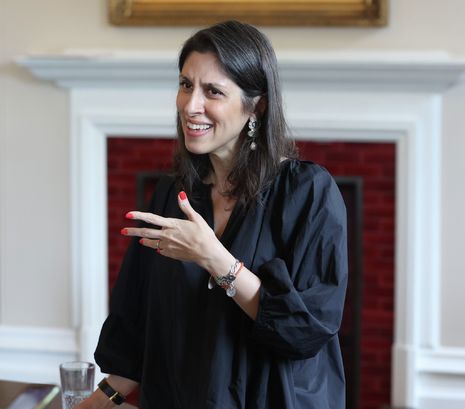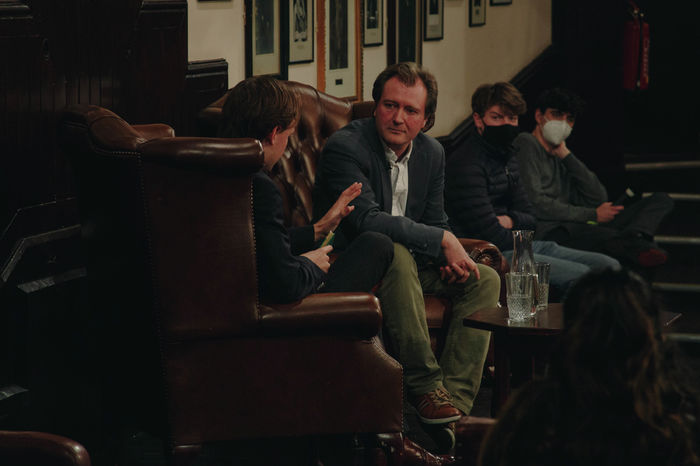‘If a regime like Iran arrests you, just shout’: Nazanin Zaghari-Ratcliffe on life after being released
Three months on from her return to Britain, Aoife O’Driscoll asks how Nazanin Zaghari-Ratcliffe is adjusting to life back at home

The political and the personal are two areas typically kept far apart. Yet that choice is not granted to some. When Nazanin Zaghari-Ratcliffe was arrested in Iran on 3 April 2016, her life took a completely different trajectory. Separated from her husband and 18-month-old child, who she was still breastfeeding at the time, and held until the UK agreed to pay £400 million debt they owed Iran, the two could not be more entangled. On 16 March 2022, the news broke that Nazanin was being released, and she was able to reunite with her family for the first time in just under six years.
It’s hard to picture the person behind the campaigns, who so many have written to and fought for, but when we sit down together, minutes before she speaks in the Cambridge Union, her tone is friendly and calm. Though she will never be the same person who left for Iran in 2016, her strength of character has prevailed, and is clear throughout our conversation. What has also prevailed is family. During both the interview and talk, her husband Richard and daughter Gabriella are never far from her. Words are not needed to understand: this is a family who never want to let go of each other again.
“If a regime like Iran arrests you, just shout”
What happened to her is almost unbelievable — imprisoned and held in Iran for six years, her basic freedoms stripped away, even spending months in solitary confinement. Yet this was not something Nazanin could have ever imagined either. “I was always very much aware that there were rules on anything the Iranian government wouldn’t like,” she says. “I had family in Iran, and I loved going back. I was very, very careful — what to do, who to read, who to hang out with.” She laughs wryly, “and then in the end I was put in prison for six years.”
Since Nazanin’s arrest in 2016, her husband Richard has been campaigning loudly for her release. His words have meant that her case has been followed by thousands of people empathising with the story of a family unjustly broken. But how much of that support was Nazanin herself aware of? “I never even imagined that there was such a level of care for us,” she shakes her head. Though she was aware of the campaign, the restrictions on communication meant that its extent remained unknown until she came back. “It was very, very short periods of visits, very short phone calls, not long to talk about things.”
Through speaking up, Richard went against the official advice to stay quiet — just one of many families forced to make that difficult decision. I asked Nazanin whether she believed there was a ‘right way’ to handle being in such a position. “There’s a lot of pressure, there’s a lot of fear, there’s a lot of anger, a lot of frustration. It’s a very personal thing how you take that, and then how you react.” Her tone grows urgent. “In my opinion, if a regime like Iran arrests you, just shout. It may not help you, but it will definitely not harm you. Just shout. Because there is a value in others knowing what’s happening to you. It might not get you out of prison on the same day, but it will definitely make your position stronger – do not keep quiet.”
Nazanin has criticised the choices the government made in response to her arrest. In 2017, then-foreign secretary Boris Johnson wrongly claimed that Nazanin was training journalists when she was arrested in Iran. Though he apologised soon after, Nazanin has spoken out about the impact which his comments continued to have during her time in prison. When I enquire about their meeting, shortly after her release, Nazanin takes a moment before speaking. “In fairness, Boris Johnson gave me time and space to tell him what happened to me,” she says. However, an apology was not explicitly given. “I wasn’t looking for an apology because I had lost the time, I was in prison, lost my daughter’s childhood, I’d lost so much that an apology wouldn’t take that back, so there was no point.” She speaks passionately — it is clear that actions matter more to her than words of remorse.
“I lost my daughter's childhood”
But does Nazanin think her freedom will mark a change in the government’s approach to these situations? “I’m not sure. I think politics is a complicated, tricky business, so who knows.” She brings up Morad Tahbaz, the Iranian-American arrested in 2018. Though it was expected that the deal made to secure the release of Nazanin would also include Tahbaz, he remains in prison. “We’re all hoping that it will end, and it will never happen again,” Nazanin says. “But you know, we can never be sure.” Still somewhat optimistic, six years of waiting to be freed has left her uncertain about future progress.
Her release is not the conclusion to her story — six years away from everything you know cannot be forgotten. I finish our interview by asking Nazanin how she is finding her first three months of freedom. “I think it’s just recovery at the moment.” The adjustment to a world that has moved on six years is something which cannot be easily prepared for – later in the Chamber, she mentions that she’s avoided using the internet since coming back; technological advances which we take for granted have become alien. However, her priority is her family. “My daughter is eight, she’s a different person. Getting to know them, getting to know what is happening around me, trying to make life a bit more normal — I think that just takes a lot of time.”
 News / Cambridge and Manchester Universities meet for innovation partnership26 February 2026
News / Cambridge and Manchester Universities meet for innovation partnership26 February 2026 News / Private school teacher who lied about Cambridge degree barred from teaching27 February 2026
News / Private school teacher who lied about Cambridge degree barred from teaching27 February 2026 News / Cambridge academics sign open letter criticising research funding changes22 February 2026
News / Cambridge academics sign open letter criticising research funding changes22 February 2026 News / Judge Business School advisor resigns over Epstein and Andrew links18 February 2026
News / Judge Business School advisor resigns over Epstein and Andrew links18 February 2026 Lifestyle / Finding a home away from home 26 February 2026
Lifestyle / Finding a home away from home 26 February 2026











![How to Create an Attractive Freelancer Portfolio [5 Tips & Examples]](https://www.varsity.co.uk/images/dyn/ecms/320/180/2026/02/vitaly-gariev-ho2tNOWZYXM-unsplash-scaled.jpg)